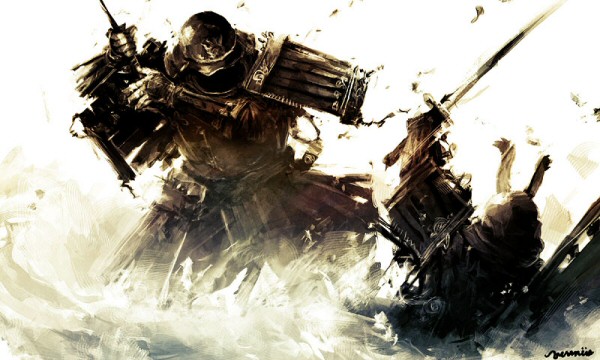Strategy without tactics is the slowest route to victory. Tactics without strategy is the noise before defeat – Sun Tzu [1]
The Tactics and Strategy concepts are largely described in the literature explained by who knows best. Their difference is also described in great length over the Internet. One of the emblematic references for these concepts is Sun Tzu’s “The Art of War”, a book that explains you the basics (and the not so basics) of warfare, leadership, tactics and strategy.
This is one of my Sun Tzu’s favorite quotes by the way:
Thus it is that in war the victorious strategist only seeks battle after the victory has been won, whereas he who is destined to defeat first fights and afterwards looks for victory. – Sun Tzu
Which basically tells that the best strategists (the best leaders, rulers) only fight when they’re absolutely sure they’ll win (when they have won before the battle has even began). This seems obvious, the devil is in the details however. It takes a great deal of intelligence, experience and intuition to be a great leader, because you’ll need to possess all of these traits (among others) in order to know when it is and it is not the best time to fight.
So, why am I bringing this up? What do I have to add to this subject?
Not much really.
The objective of this post is not to teach you the difference between Strategy and Tactics, since I would not be the best teacher available, as I have my share of doubts too. This article aims on helping us know more about these concepts and understand their differences a little bit better, since after all they are at the heart of this blog’s theme. Moreover these concepts are not only important in the gaming domain but also very useful to apply in other areas of our lives as well.
You have some references at the bottom of this article in case you want to learn more about this subject.
What is Tactics?
One must change one’s tactics every ten years if one wishes to maintain one’s superiority. – Napoleon Bonaparte
In this article I’ll focus on military tactics, which is how the tactics concept is usually presented in games.
Military tactics is the science and art of organizing a military force [3], prepare it, equip it and lead it with the aim of defeating an enemy in battle.
Factors that the tactician should take into account when deciding how to fight are usually: the terrain and the location where the battle is to be fought; possible obstacles found there; the weather conditions; the numbers involved (men, weapons and machines). All this information is extremely important to have in order to determine the best formation to use and to consider if the use of ambushing, flanking or reconnaissance are necessary. But probably the best weapon that the tactician wants to have in its possession is information about the enemy. The more of it he has the better the outcome ought to be.
The Generals, Commanders and Admirals are usually the tacticians, of an army, navy or fleet.
What is Strategy?
All men can see these tactics whereby I conquer, but what none can see is the strategy out of which victory is evolved. – Sun Tzu
Strategy is the art of “careful, skillful thinking and planning in order to achieve victory” [4]. I would replace “victory” by “a goal” to make it more broad and general without loss of meaning.
In military terms strategy is distinct from tactics where tactics is concerned with the actual engagement and events of a battle while strategy is concerned with how different engagements (battles) are linked and how that affects the global picture of a campaign or any other endeavor’s progress towards achieving a high-level goal.
How a battle is fought is a matter of tactics. Whether it should be fought at all is a matter of strategy – Wikipedia
If the Admirals, Captains and Generals are the tacticians then the Governors, Rulers and Emperors, are the strategists with the role of managing a city, a nation or a spacefaring civilization.
Strategy Video Games
Now, with respect to strategy games, the subject of this article in particular, things are a little bit different. That’s here where things normally start to get fuzzier (at least to me it had that effect).
In strategy games all strategy elements apply (naturally), however strategy games normally comprise other kinds of disciplines as well, that are not strictly related with strategy. For example strategy games normally present other challenges to the player other than the strategical, like tactical, logistical and economical challenges. That’s why usually (and I tend to agree with this classification [2]) strategy games come in different flavors and include tactical games as sub-genres. There are other types of strategy games but I’ll keep the list to what I consider to be the main five for the sake of simplification.
Strategy games’ main sub-genres:
- 4X (eXplore, eXpand, eXploit, eXterminate)
- Real-time strategy (RTS)
- Real-time tactics (RTT)
- Turn-based strategy (TBS)
- Turn-based tactics (TBT)
The description of each of these sub-genres is out of the scope of this essay, but if you’re interested to know a bit more on 4X games for example I invite you to read What are 4X Games: a Definition and links to Games.
Examples of 4X games are the Civilization series, Master of Orion series and the Galactic Civilizations series among many other titles. Examples of RTS games are the Homeworld series, Command & Conquer series or the StarCraft series. Examples of RTT games are Star Hammer Tactics, World in Conflict and Warhammer: Dark Omen. Finally, examples of TBT games are the X-COM series or Jagged Alliance series.
Conclusion
Tactics and Strategy are different concepts and imply different things. While the former deals with the details of engagement such as the best way to undertake a battle (or another type of task at hand) the latter deals with longer-term and higher-level objectives that require a great deal of thinking and planning in order to achieve a goal. In games usually that means achieving victory.
It’s not only a question of scale but also a question of actions involved. While the strategist deals more with thinking ahead, planning and scheming the tactician deals with situation analyses and execution with what is provided to him. Both include decision as a central aspect however. With a bad decision the tactician may lose a battle, with a bad decision the strategist may lose the entire war.
In gaming, strategy video games normally comprise more than strategy elements only. Tactical games are a sub-genre of strategy games. It is natural to be so in my opinion because in many strategy games the intention is not only to allow the player to plan the road to victory but also to allow him to experience the action and the execution of the events that are part of that plan. In war games this is particularly true. The player is invited to not only think which is the best way to achieve victory in the long run but also to experience the hack-and-slash of war.
So, when we are talking about strategy games we are talking about both strategic and tactical games. And in many cases strategy games contain aspects of both concepts in their gameplay.
References
[1]: The Art of War, Sun Tzu, Shambahla Publications, 1988
[2]: Video Games Genres – Wikipedia
[3]: Military Tactics – Wikipedia
[4]: Strategy – Wikipedia

13 Comments
Related Articles:
- What are 4X Games: a Definition and links to Games
- Star Hammer Tactics Released for the iPad
- Space Sector’s Bargain List: GOG’s 2013 Winter Sale is Up
- Star Hammer Tactics Now Available for PC
- Star Hammer Tactics Preview








Wow this actually helped me alot of seeing the difference between strategy and tactics. So doesn’t that mean most RTS games are basically tactical games since the use of terrain, scouting, and tactics. Does this also mean that 4X games are more strategic than tactical?
Also thanks for posting this Adam.
You’re welcome. I’m glad I was able to help you out a bit on this subject.
Regarding RTS games being more tactical, it depends. There are normally other tasks to accomplish and many other things to consider by the player than just battle or preparation for it. You have to manage resources, plan and decide many things such which units would be more appropriate to build, if it is advantageous to build more bases, units or both. You can decide to evolve your game economy more or start your skirmishes earlier. So, every decision you have to make in order to reach victory (normally in an RTS it is to wipe out a oppoenent from a map) other than the battles themselves are considered strategy.
Now if you consider the amount of time you’re doing one or the other probably you spend more time on an RTS doing battle than deciding what to do next. Those are the kind of games I don’t like so much. I prefer strategy over tactics any day.
Discerning strategy and tactics is something I’ve always struggled with.
I use two rules to try to help myself determine if something is related to strategy or tactics.
If it is about what to do (to accomplish a goal), I associate it with strategy. If it is about how to do it, I associate it with tactics.
It’s been a useful metric so far.
It seems to me that what is a matter of tactics for one person can be a matter of strategy for another, or vice versa.
If strategy is indeed about accomplishing a goal, then tactics must be about subgoals. The person who adopts a subgoal then must consider strategy to accomplish that goal. His or her strategic considerations are tactical considerations to his or her superiors.
Am I making sense?
You’re making sense, however I’m not sure if I completely agree with you, although I do understand what you mean.
It also crossed my mind at times (and at the writing of this article also) that tactics seems to be more related with the “how” while strategy seems to be more with the “what”, as you point out. But then I realize that it is with the “how” to do battle that tactics is associated with. Strategists also have to answer to that same question too. For example “How will I acquire that planet or resource? (from a global perspective, not just from a battle perspective). Will I build a superior fleet and win in battle? Will I build influence in that region of space in order to obtain it? Will I cause a revolt and wait? Will I take it by force or by peaceful means?
It seems that strategy is more of a what/if scenario analysis I agree with you there, but the “how” is also present in strategy. So, I don’t know if that’s a good metric, although it may be helpful sometimes perhaps.
Regarding goals and sub-goals, yes I would consider tactics’ goals strategy’ sub-goals. So, if a goal is to defeat a player a sub-goal is to win a specific battle.
Now regarding “His or her strategic considerations are tactical considerations to his or her superiors”. That’s an intriguing point. Let’s make a small exercise. A commander instructs his lieutenant to flank the adversary in the hills. Both are applying tactics, only at a different scale, but to me it’s both tactics. If an emperor asks his generals to conquer a specific planet (in order to acquire a special resource for example) then the Emperor’s decision is a strategic one. The general’s and commander’s decisions will be tactical since they are going there to do battle and win, they don’t need to bother with anything else.
So in your hypothesis when an Emperor instructs a regional sector viceroy to achieve something, the Emperor would see his subordinate regional governor actions as tactical toward achieving his goal. I’m note sure about this. It seems to be all strategy to me. Tactics will only start when battles begin.
What do you think?
“What do you think?”
If I ever figure it out I’ll let you know.
ok :)
To use another game to make a point:
The international Bridge player Giorgio Belladonna said: “You can’t play a card without a game plan but after your opponent play his card your game plan has to be discarded and reformulated”.
In bridge the distinction between strategy sand tactics is straightforward: tactics is the card falling on the table, the strategy is how you plan to achieve your contract (or vanquish the opposition one).
If you want to win both have to be done in parallel. If you want to be a champion strategy is where you will earn the laurel.
>> With a bad decision the tactician may lose a battle, with a bad decision the strategist may lose the entire war.
Steve Jobs said (more or less) they a good leader is the one that is capable to make a good decision every ten.
Strategy is more forgiving than tactics, the detachment from the battlefield permit much more maneuver space.
Bill Gates, after years of dissing internet, clearly come to understand his strategic error and in the nick of time reconstructed the Microsoft behemot in a very internet conscious beast.
One reason that muddle the strategy/tactic relationship is the question of scale: it is clearly uncomfortable to say that politician are the strategists and the military people are the tacticians.
The poor Von Clausewitz (another name that has to be put in any discussion about this theme) would be left out.
From a game point of view, trying to not become too reductionist, I would add the operational level.
The leaders define the grand strategy, when that will call for military action then the generals and admirals will take charge to define the operational strategy and then it will be in the field that the tactics will be put in use.
I know that Adam likes, in his 4X games, to be able to micromanage the tactical level. My opinion is that when I play 4X, especially in such enormous milieu like the one of Grand Strategy Space games, I prefer to stay at the operational level.
That is not inconsequential: the game has to be designed to make each level where the player intervention is required fun and consistent.
Not all af them active that.
“I know that Adam likes, in his 4X games, to be able to micromanage the tactical level.”
I like to have that opportunity, yes, to take charge of battle and not only watch a cinematic if that’s possible (that’s why I prefer MoO2 or DW battles over GalCiv2’s ones) but that’s not the most important part in 4X games for me, far from it.
I prefer strategy over tactics at any day. You’re right though on the liking to micromanage, but definitely not the tactical side. I like to prepare, watch and intervene in my spaceship battles from time to time of course but that’s not that important to me. That’s mainly one of the reasons why I don’t enjoy fast paced RTS games so much (like StarCraft. Ok kill me). I prefer to have my time to think things over which is another reason why I prefer TBS over RTS also.
Another example. I love Civ4 BTS but I prefer Civ5’s combat system. In Civ5, as many of you know, combat requires a higher degree of tactical decisions, since you can’t stack troops anymore. You have to careful arrange your armies on the battlefield’s hexes and then attack in the correct order. You are now able to pick which units actually attack, previously (in Civ4) that was chosen for you (in both offense and defense). So you see, I like both systems. One where you micromanage more tactics and the other that offers less tactical options. In the end of the day I think if a game offers more tactical options without sacrificing the strategy elements, is more complete, and ultimately better.
About CIV IV and CIV V combat I have a mixed feeling: while is true that in CIV V you have a little more tactic involved the scale is firmly in the operational level and having a group of archer that control such an immense territory is so unrealistic that is a big let down.
The stacks in CIV IV (and III) are less pleasant and interesting but in the end they managed to be a little more realistic from a scale point of view.
I know, it is just a game, but I feel that somewhere there is a better solution that do not mix too much different levels.
Also the territory division is a big problem in the Civilization series and there I think that hexagons are better, if just marginally, than squares.
I agree. The worse aspect of Civ5’s tactical combat is watching a long bow archer shoot an enemy over seas (3 hexes away). Artillery we could buy but an archer?! But those are minor issues I guess, that the devs could tackle if they wanted to give to the trouble.
Although a bit out of the subject I’ll add that I’m not actually defending Civ5 over Civ4 w.r.t. to combat (or any other matter). Civ4 BTS is still the best game overall in my opinion. I like both combat systems, however I slightly prefer Civ5’s because it gives you more options. They’re different. If you’re not much of a tactician probably you’ll enjoy more Civ4 BTS however.
And I agree with you that an excellent combat system (for Civ, but not only) is still to be designed.
You’ve produced an excellent piece here Adam. I loved the article, specially the Sun Tzus’ references; I just love the guy! ;) Moreover while reading the article I just came up with a pretty cool idea for tactical modifiers for space battles, I just started working on that and all ideas are more than welcome. Regarding the tactical battles on CIV V, I have to agree wholeheartedly with bertipa here; they totally kill immersion. But maybe the abstraction level in CIV V is too high for me and that’s it.
Thanks Fernando. I’m glad you liked it and it was useful to give you an idea :) I also like Sun Tzu a lot, as you can possibly tell :)
Yes, long-bow man shooting 3 hexes away kill immersion I agree. But as I’ve replied to bertipa it was not much of a question of defending Civ5’s battle system. Although I have mixed feelings also I still prefer Civ5 combat in the end of the day over Civ4 because I don’t like SoD (Stacks of Doom) so much and not having the possibility to choose which troops attack or defend. I just noted that Civ5 contains more tactical elements. If it’s done brilliantly, well … that’s another story :)
But Civ is not really much about how the battle is fought but when it is fought, if it’s fought at all. Unfortunately in Civ5 (and that pisses me off) you don’t have a choice. You have to fight sooner or later (more sooner than later) and I don’t particularly like that.
Now that I read your comments and my own again it’s clear that I also have plenty of mixed feelings regarding which combat system is the best. If Civ5’s or Civ4’s. You got me there :)